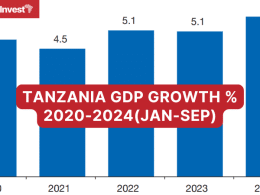Tanzania’s export earnings from pyrethrum have risen to TZS 19 billion in 2023/24.
This statement was made on 7th November 2024 by the Director of the Cereals and Other Produce Regulatory Authority (COPRA) Irene Madeje Mlola at the 14th annual pyrethrum stakeholders’ meeting in Dodoma.
Mlola highlighted that the value of Tanzania’s pyrethrum is rising due to increased production, benefiting an estimated 10,000 farmers and boosting the national economy.
She added that payments to pyrethrum farmers have increased from TZS 6.2 billion to TZS 13.4 billion in 2023/24 signaling major progress in the agriculture sector.
She attributed the rise in export earnings to the price rise of pyrethrum from TZS 2,600 per kilogram in 2020/21 to TZS 3,500 per kilogram in 2023/24.
Mlola assured farmers that the government, through the Ministry of Agriculture, is committed to supporting quality pyrethrum production and will continue to guide them to increase crop quality.
On his part, Lucas Ayo, the Director of the National Pyrethrum Board, announced that starting from November 8, 2024, the price of pyrethrum has increased from TZS 3,500 to TZS 3,700 per kilogram.
Ayo also indicated the possibility of further increases, potentially reaching TZS 5,000 per kilogram, based on the crop’s quality.
He encouraged farmers to adopt the best farming practices to ensure premium-quality pyrethrum.
He added that the production of pyrethrum is expected to reach around 10,000 tons by 2030, underscoring the growing economic potential of this crop in Tanzania.
Pyrethrum in Tanzania
Pyrethrum, derived from the flowers of Chrysanthemum cinerariifolium, is highly valued for its natural insecticidal properties, making it a preferred choice in organic pest control.
Tanzania’s pyrethrum is primarily cultivated in six regions: Mbeya, Iringa, Njombe, Manyara, Songwe, and Arusha hosting a network of between 14,000 and 17,000 farmers engaged in pyrethrum production.
Recent estimates indicate that Tanzania has approximately 13,941 hectares dedicated to pyrethrum cultivation, with an annual production of around 4,200 metric tons during the 2022/23 season, positioning it as the second-largest producer in Africa after Kenya.
The exoports of pyrethrum have shown positive growth, with exports rising by 15% in recent years, and countries such as the US, Japan, and China being key destinations.
The Tanzanian government, alongside other stakeholders, actively supports pyrethrum farmers by purchasing pyrethrum through entities like the Pyrethrum Company of Tanzania (PCT).










